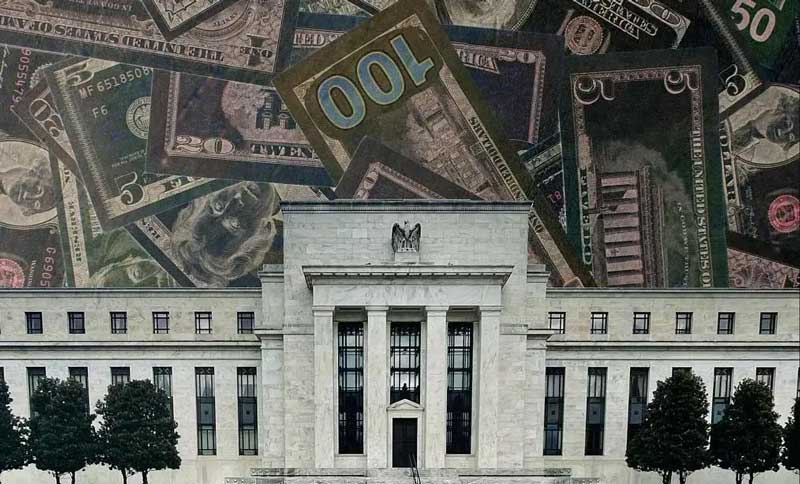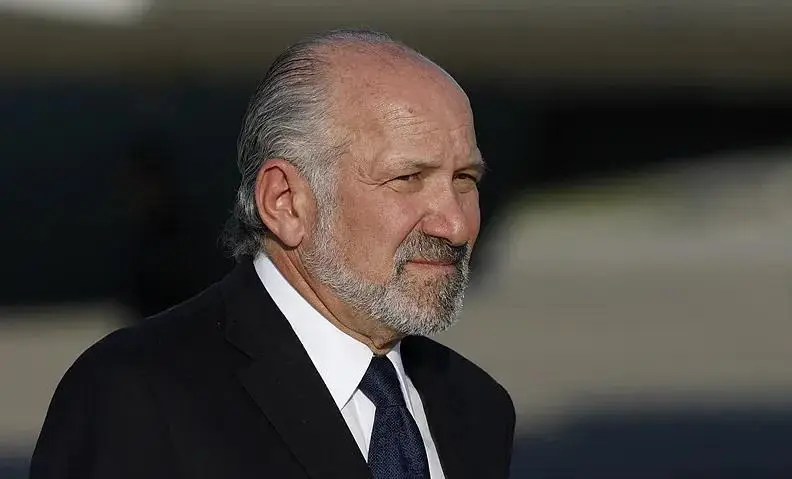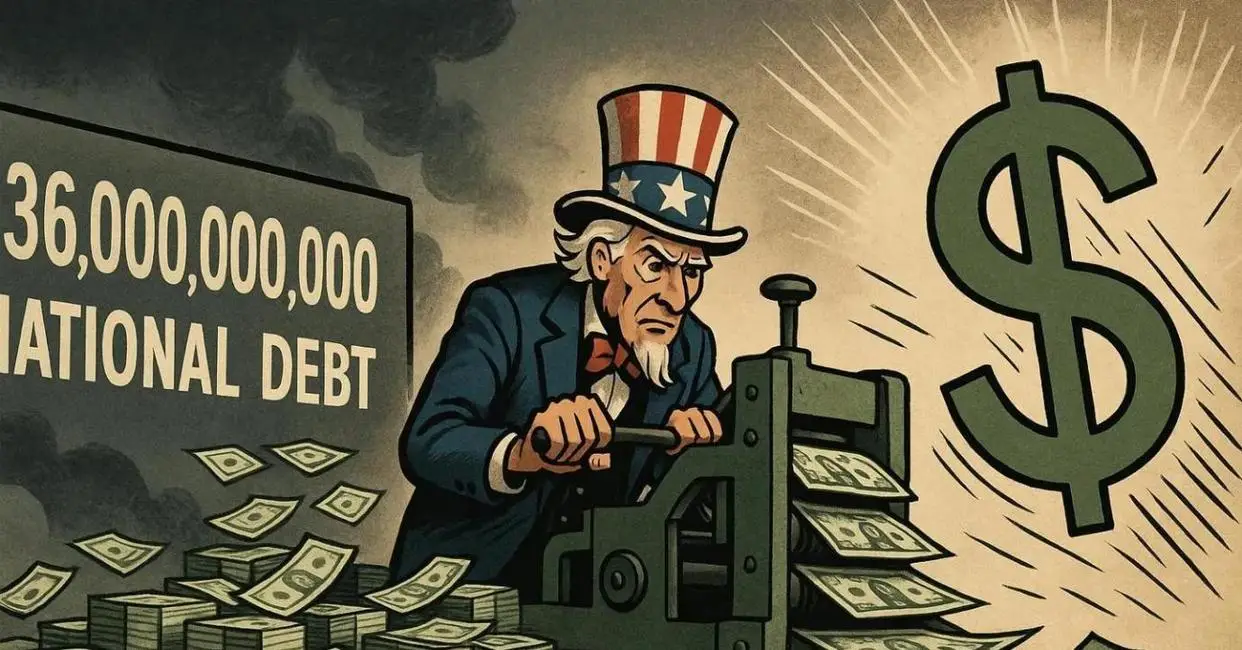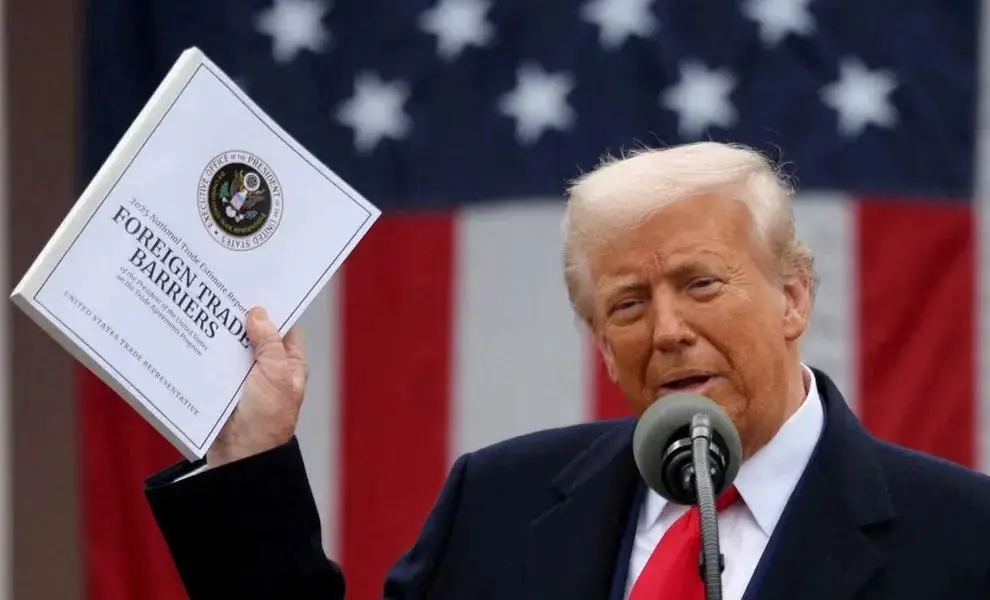US $36 trillion national debt crisis: Trump's desperate gamble
In July 2025, the scale of the US national debt is shocking, reaching $36.7 trillion, equivalent to a huge debt of $110,000 for each American. This debt is continuing to expand at a rate of $55,000 per second, an increase of $4.7 billion per day, like an unfillable black hole, swallowing up the economic future of the United States. The Treasury Department is facing huge repayment pressure: $10 trillion in national debt will mature this year, while last year's federal tax revenue was only $4.9 trillion, and even the interest payments are stretched.
Faced with such a severe situation, the Trump administration has launched a series of jaw-dropping "debt reduction plans", but ultimately fell into a deadly self-destructive cycle.
First, it is an attempt to "open up the source": On August 1, the Trump administration brazenly imposed a 15-0% tariff on goods from 150 countries including the European Union, Japan, and South Korea, and no longer extended it. On the surface, it claims to "make America great again", but in fact it hides the sinister intention of resolving the huge national debt.
"Compromise" with Japan: Japan was forced to reduce its automobile tariff from 50% to 15%, but the steel and aluminum tariffs remained unchanged. At the same time, it was required to invest $550 billion in the United States, and 90% of the profits belonged to the United States.

Confrontation with the European Union: Germany made a tough statement that "if you want to fight, then fight", and prepared to announce a counter-list on August 7, targeting iconic American industries such as Boeing aircraft and Kentucky whiskey.

Conflict with China: China imposed a 125% tariff on American goods, and General Motors lost up to $1.1 billion in a single quarter.
However, this seemingly "open source" tariff policy, like a boomerang, hit the US economy hard. Walmart, Amazon and other giants were forced to raise prices across the board, from daily necessities to pet food. According to a study by Yale University, American families will spend an average of $2,800 more this year, and the loss of low-income groups is three times that of wealthy families. Even ordinary coffee was not spared. Since the United States produces almost no coffee beans, the 50% tariff has caused Brazilian suppliers to withdraw, and Americans are even threatened with their freedom to have breakfast coffee.
The failure of the tariffs forced the Trump administration to use the ultimate weapon - the "Mar-a-Lago Agreement", which was nicknamed "Plaza Accord 2.0". The core of this conspiracy is to force creditor countries such as Japan and Germany to "debt swap": replacing the US debt they hold with 100-year zero-interest bonds, which means that these countries will not be able to earn any interest for a long time, and the bonds cannot be traded or redeemed. If they need money urgently, they can only borrow from the Federal Reserve. The United States promised to provide "security protection", which is actually a disguised protection fee extortion.
What is even more incredible is that the US government even tried to use Bitcoin to repay the national debt. The Treasury Department plans to issue "Bitcoin-enhanced Treasury bonds", investing 10% of the principal in Bitcoin, betting that its annualized 36% surge can cover the interest. However, once the price of Bitcoin plummets (such as the one-day halving in 2024), countries holding these bonds will face the risk of losing all their money.

At the same time, the Trump administration put pressure on the Federal Reserve to cut interest rates sharply. On July 25, Trump triumphantly announced: "Powell is ready to cut interest rates!" He demanded that the interest rate be cut directly from 4.75% to 1%, claiming that for every 1% interest rate cut, the government can save $400 billion in interest expenses. However, there is strong opposition within the Federal Reserve: the core inflation rate is still as high as 2.8%, and a rash interest rate cut may cause prices to get out of control; tariffs push up import costs, and interest rate cuts are tantamount to "adding fuel to the fire"; employment data in June has already shown negative growth, and interest rate cuts may trigger stagflation in the 1970s. Trump even threatened to fire Powell, but legal experts warned that this would lead to the collapse of the dollar's credit. Saudi Arabia, Russia and other countries have begun to accelerate the sale of US bonds and turn to the renminbi.
Trump's "debt reduction tactics" eventually fell into a vicious circle: tariffs pushed up corporate costs, leading to layoffs and shrinking consumption, triggering an economic recession; while the economic recession should have prompted interest rate cuts, the inflation caused by tariffs has tied the hands of the Federal Reserve, interest rates remain high, and the interest burden is heavier; wanting to issue bonds to survive, but Fitch has warned that the debt/GDP ratio will exceed 135%, and the interest rate of new debt will be higher.
Even Musk's "Government Efficiency Department" laid off 120,000 people and saved $18 billion a year, which is just a drop in the bucket. The legendary Bitcoin Treasury bond that can "resolve trillions of debts" has been collectively boycotted by China, Japan, Europe and other countries due to the huge volatility of Bitcoin, and has not yet been issued.
On July 27, Trump urgently met with EU representatives, and the cold response of German officials-"If they want war, they will get war"-foreshadowed the further deterioration of the US Treasury crisis. The Fed's rate cut button is hanging in the air, the countdown of the $36 trillion national debt is ticking, and ordinary Americans have found that even drinking a cup of cheap coffee has become a luxury. General Motors lost $1.1 billion in tariffs in the second quarter, and its net profit plummeted by 35%; auto giant Stellantis suffered a net loss of $2.7 billion in the first half of the year and plans to lay off 12,000 people; Amazon also cannot bear the pressure of tariffs and is forced to raise prices for cheap daily necessities because "the tariff cost transfer ratio has reached 90%."
Tariffs have caused American supermarket shelves to become increasingly empty, and the prices of home appliances such as dishwashers and refrigerators have risen and the quality has declined, and Hawaiian coffee farmers have gone bankrupt. Low-income groups are the first to bear the brunt, and the price increase of necessities has caused their disposable income to drop sharply by 12%. The Nasdaq plummeted 2.64% in a single day due to the threat of tariffs, and chip stocks such as Nvidia flashed 8.69%. The 10-year U.S. Treasury yield soared to 4.4%, and the cost of borrowing new bonds soared. What's more dangerous is that if the default of U.S. Treasury bonds triggers a sell-off, the 30-year yield may exceed 5%, triggering a global bond market collapse.

Trump's "debt default plan" ultimately failed, exposing the shortsightedness and danger of his economic policies and casting a shadow on the global economy.

%20--%3e%3c!DOCTYPE%20svg%20PUBLIC%20'-//W3C//DTD%20SVG%201.1//EN'%20'http://www.w3.org/Graphics/SVG/1.1/DTD/svg11.dtd'%3e%3csvg%20version='1.1'%20id='图层_1'%20xmlns='http://www.w3.org/2000/svg'%20xmlns:xlink='http://www.w3.org/1999/xlink'%20x='0px'%20y='0px'%20width='256px'%20height='256px'%20viewBox='0%200%20256%20256'%20enable-background='new%200%200%20256%20256'%20xml:space='preserve'%3e%3cpath%20fill='%23FFFFFF'%20d='M194.597,24.009h35.292l-77.094,88.082l90.697,119.881h-71.021l-55.607-72.668L53.229,232.01H17.92%20l82.469-94.227L13.349,24.009h72.813l50.286,66.45l58.148-66.469V24.009z%20M182.217,210.889h19.566L75.538,44.014H54.583%20L182.217,210.889z'/%3e%3c/svg%3e)




